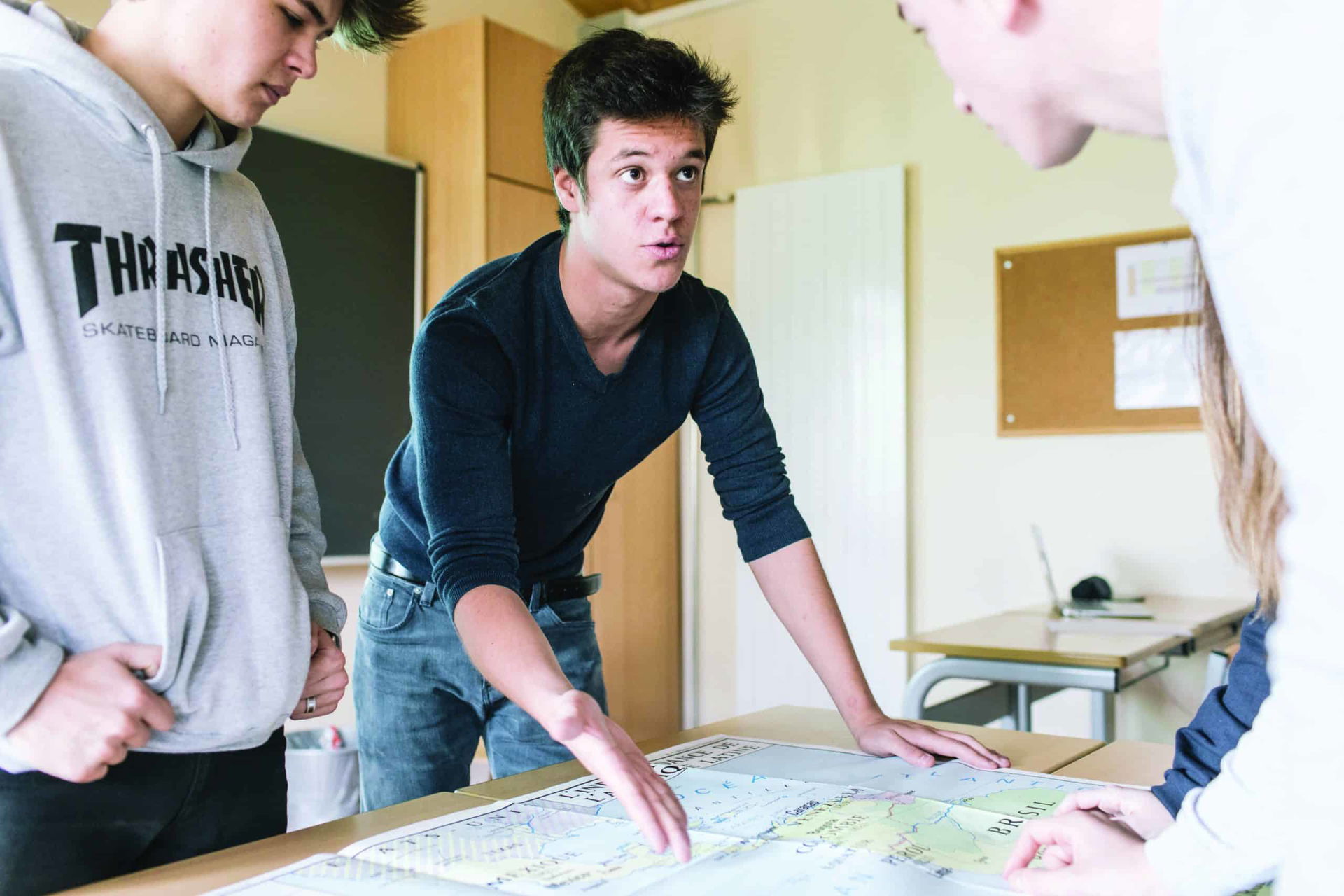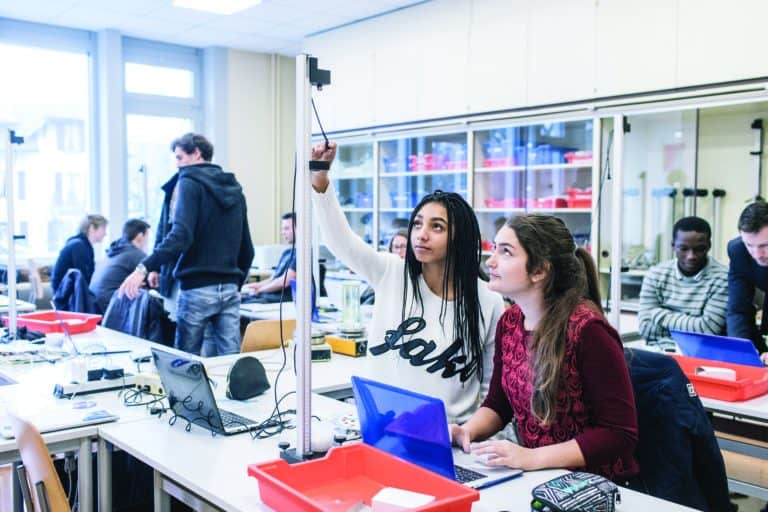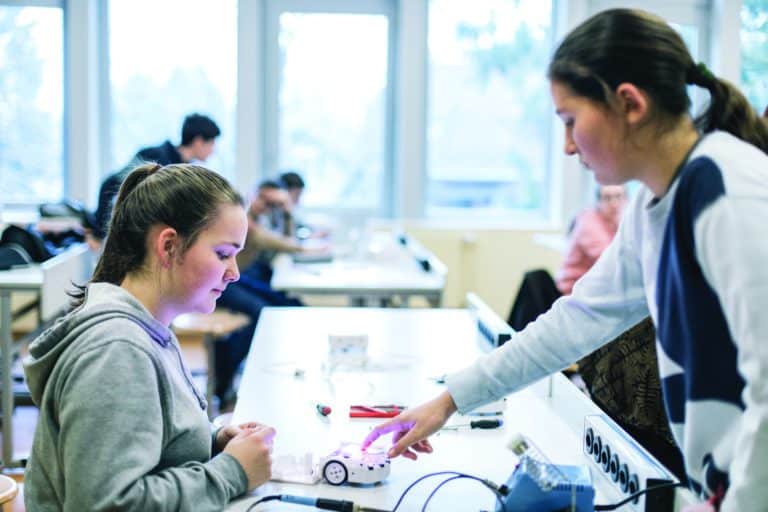An Interview with Noha Benani

Noha Benani, Director of International Section and International Baccalaureate, Florimont Institut, talks to Nick Gilbert, Editor and Publishing Director of International School Parent Magazine about how to flourish throughout the IB Diploma Programme.
What skills and qualities does the IB aim to bring out in students?
The IB programme is aimed at developing the whole person, not just the academic qualities. It aims to help young people develop socially, aesthetically, athletically and emotionally. Developing both the academic side and the personal side means preparing young people for their life and career ahead of them.
The students are exposed to five main domains of learning and a lot of personal experiences, which help them grow in the areas of Creativity, Activities, and Service (CAS) and also in building international mindedness, theory of knowledge, and more. From a personal and professional standpoint, these act as the cement that holds the programme together.
Florimont is unique in offering students the French Baccalaureate, the Swiss Maturité, and the IB diploma. What would you say is different about what the IB brings out in students at Florimont?
The IB gives students the chance to express themselves, both academically and personally. Students can push themselves beyond a taught syllabus by questioning teachers and people in the community or the rest of the world through their own research.
We like to guide youngsters to more intellectual curiosity and more interest in the world around them. Whether that starts in their local community, in Geneva, Switzerland, or the rest of the world.
We also encourage self-motivation and autonomy, especially when they come through early secondary, as they have generally been cocooned. We want them to become themselves, explore their own interests, and things that in some academic settings might not be possible.

What advice would you give to a student who’s just about to embark on the IB diploma programme?
The IB Diploma programme doesn’t demand Einsteinian intelligence; the key is to be motivated. The beauty of it is that students can succeed with 24 points as well as 42 points. The idea is for students to challenge themselves and measure themselves against the progress they are making.
I would also advise that students realise that it’s a very demanding programme and there are great expectations and a large volume of work in the classroom, and outside, independent, autonomous work. We expect students to be able to work in groups as well, collectively, as well as being a self-starter.
If there is a parent reading that and thinking, “that is not how I would describe my child”, what can they do to prepare their child for the IB Diploma?
They can ask their child questions until they’re blue in the face, and encourage and give them the possibility to converse, to work with others, to make contacts in a community. It’s important that parents help us draw them out of their cocoon. Parents can also help make students realise that there’s a lot of work, so time management skills are very important.
What are the most challenging aspects of the IB Diploma programme that students don’t necessarily expect?
As we’ve been discussing, time management is one of them. However, there are other skills that are required for the Diploma programme that might not be in the other secondary programmes around the world.
Firstly, communication skills because students come out with a facility for communication in at least two languages, in written and verbal form and almost 100% of students have a bilingual diploma. Second, analytical skills, including scientific methods, across different fields. Third, academic honesty is very important because ongoing revision is so key to success. Whatever the profile of the student, if they are prepared to make an effort, we can draw those skills out of them in the Programme and equip them for their life ahead.
Diploma Programme students are very attractive to firms, especially in the tertiary sector, because they come out with knowledge to a certain level in a lot of different fields and subjects, but mainly because they can be trained in a professional sense.
Students are told to revise regularly throughout their diploma, but many go through most of the Diploma Programme without touching on the things they did in year one. What should revision look like in practice and what tips do you give to parents to help them facilitate that?
Parents can’t expect to help their sons and daughters with all the content of the course, but they can keep an eye on how and when they use their computer, and establish a dialogue with them. Asking even the question, “what did you do at school today?” gets the kids thinking about it.
Here are a few tips:
For work routines:
- Help them to prepare a review plan now.
- Identify an environment conducive to work (alone in their bedroom is not always the right solution; the dining room table while you are present may be a better option in many cases).
- Encourage them to take regular, short breaks.
- Remove distractions. For example, prompt them to set electronic “notifications” to “do not disturb” so that they can concentrate on their work.
For balance between study time and rest:
- Establish a healthy balance between rest and relaxation and dedicated study time.
- Maintain a proper sleep pattern. For example, they could read or listen to music, rather than study or watch a movie, the hour before bedtime.
- Exercise and sports are very beneficial habits.
- Maintain a balanced diet with plenty of fresh fruits and vegetables and adequate hydration.
For setting up a supportive atmosphere:
- Encourage your child to define his or her ambitions and set personal goals.
- Try to offer your support while still encouraging autonomy.
- Observe how your child is dealing with their stress. Actively listening can often be enough to support them.
Keeping up with their work is very important. They can ask their teachers before they start a lesson, to go over very quickly, what they’ve done in a previous lesson, so that there’s more fluidity established. Then, expect at least two hours of homework every night for day-to-day work, and put aside a lot of time, the right amount of time for internal assessment in each of their courses and the extended essay.
Sometimes students spend too much time on internal assessment and the extended essay. It’s good to get caught up in it, be interested in it, but it’s got to be given gradual time. It’s not something that can be done overnight or even in two days of concentrated work.

What can these students do to not just survive the IB Diploma Programme, but thrive and enjoy it, and get the most out of it for what they are going to do next?
We hope that they’re going to take advantage of the people who are teaching the programme. We want them to feel comfortable and they might need a little encouragement to let themselves get into it. Supposedly, they’ve chosen their subjects and their options in line with their interests, their university objectives, and their career goals. So there should be subjects for which they are enthusiastic.
I think the visual arts are an absolutely fantastic way for students to express themselves outside of the classic classroom. But they can do it in a lab if they’re a scientist or through their extended essay. I think they have to have confidence in the school and comfort with the teachers. It boils down to trust and confidence, and establishing a good, consistent routine and rhythm of working.
It’s also important that they break up the intensity of work with holidays, outside events, visits, excursions, and also having people from the real world come to school and talk to them.
It’s very important that students take time off. Even during a school year, they have to balance study time and downtime. They’ll have to use the summer vacation for finishing up their extended essay, but that doesn’t mean they can’t go off on holiday. They have to take advantage of holidays to revise but that doesn’t mean they can’t meet up with friends or do enjoyable activities as well. Again, it’s a question of using one’s time wisely.
There is not much spare time but by working back from the end, and setting deadlines, we try to help them to realise that it’s really 18 months and that if they do their planning and keep up the good regular working, it’s manageable.
How do you manage internal deadlines and mock exams for the IB Diploma Programme?
What we’ve done this year in fact, is for the Terminale students to cancel their December exams and give them the class time. Then we’ll have mocks next March. We’ll have the Premières go through a first session this year, in December, but not the Terminales. Then after the mock exams they’ll have four or five weeks for revision.
Find more articles like this here: www.internationalschoolparent.com/articles/
Want to write for us? You can submit an article for consideration here: www.internationalschoolparent.submittable.com
